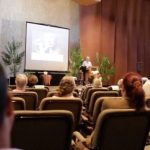
Nine Sessions with Joseph Cambray, Linda Carter, Avedis Panajian, Joseph Bobrow, and Lionel Corbett
at Pacifica Graduate Institute’s Lambert Lane Campus
In the process of becoming a psychotherapist, high quality supervision is extraordinarily valuable. However, most programs do not teach the skills and approaches needed to become a supervisor. Many therapists simply have to rely upon the way they were supervised, in a de facto mentor model. More recently the literature on supervision has included attention to assessing and developing both the skill sets and psychological attitudes that best foster the growth of new supervisors. Differences between practicing psychotherapy and supervising the work of others are now recognized and separate trainings are recommended. In this 9 session course a number of senior clinicians who have done supervision in multiple settings, will offer some models for becoming a supervisor from a depth psychological perspective. Practical applications of supervisory materials will be a central focus of the course, which will have a case colloquium format.
This program is open to mental health practitioners and students in clinically-oriented graduate degree programs.
SCHEDULE
October 6, 2016 – Joe Cambray
The initial session will provide a basic introduction, including setting up a depth oriented supervisory practice (practical and theoretical considerations) and establishing a supervisory alliance—issues of shame and authority; common dilemmas and possible resolutions.
November 3, 2016 – Avedis Panajian
The second session will address types of supervision, hazards and value of supervision, exploring the complex relationship between supervisor/supervisee— including boundary issues, transference, and countertransference dynamics in the supervisory process.
December 8, 2016 – Joe Cambray
The third session will provide an introduction of unconscious dynamics in supervision, including the use of dreams; the role of parallel process and other field phenomena.
January 26, 2017 – Avedis Panajian
The fourth session will cover the misconception of all knowing supervisor, note taking (or other forms of recording) for supervision, confidence vs insecurity in the supervisor, supervision as a second opinion vs supervision relying on the myth of a technique, and supervision that aims to create a co-construction of a field between supervisor and supervisee through each surrendering to their own state of reverie.
March 2, 2017 – Linda Carter
The fifth session will cover acceptance and fair critique in supervision and how to reflect on unconscious parallel process in the treatment and supervisory relationships. The co-constructed relationship in the therapy and the supervision will be considered using Jung’s alchemical model of Sol and Luna from Volume 16, The Psychology of the Transference.
March 30, 2017 – Joseph Bobrow
The sixth session notes the limitations of the terms transference and countertransference, and explores the overarching concept and ubiquitous phenomenon of unconscious emotional communication both within the individual and in the intersubjective relational field as it develops moment to moment in therapy and supervision. The notion of presence of mind will be examined as a palpable primary presence as explored by Milner, Balint, and the presenter. Supervising cases will then be approached where traumatic impacts are a primary feature, either in the patient, the therapist or the supervisor, and what contribution Zen meditation might make to the work.
May 4, 2017 – Linda Carter
The seventh session will focus on attachment styles as they emerge in treatment and supervision as well as how to consider both the explicit and implicit modes of communication.
June 8, 2017 – Lionel Corbett
The eighth session will cover historical perspectives on supervision, models of supervision and the teach/treat issue.
July 6, 2017 – Lionel Corbett
The ninth session session will speak to the relational model of supervision and regression in supervision.
PRESENTERS
Joe Cambray
Joe Cambray, Ph.D.,is Provost and Vice-President of Academic Affairs at Pacifica Graduate Institute as well as a Jungian analyst. He is Past-President of the International Association for Analytical Psychology, and former US Editor of theJournal of Analytical Psychology. For years he was on the faculty of the Center for Psychoanalytic Studies at Harvard Medical School where he co-taught a year long course on becoming a supervisor. His numerous publications include the book based on his Fay Lectures:Synchronicity: Nature and Psyche in an Interconnected Universe; a volume edited with Linda Carter,Analytical Psychology: Contemporary Perspectives in Jungian Psychology; and a two volume compendium on research in analytical psychology co-edited with Christian Roesler and Leslie Sawin currently in publication. In addition, he has published numerous papers in a range of international journals.
Linda Carter
Linda Carter MSN, CS, is a Jungian analyst who was in private practice in Boston, Massachusettes and in Providence, Rhode Island for more than 30 years. Currently, she practices in California and teaches at Pacifica Graduate Institute. She is a graduate of Georgetown and Yale universities and has been in practice for close to 40 years seeing children, adolescents and adults. For 5 years she was the US Editor-in-Chief of theJournal of Analytical Psychology, the foremost clinical Jungian journal, based in London. For three years prior to taking this position, she was the Book Review Editor for the same journal. Linda is a co-editor ofAnalytical Psychology, Contemporary Perspectives in Jungian Analysisand co-author of a chapter in that book called “Analytic Methods.” She has written numerous articles and book chapters and taught and presented her work all over the world.
Avedis Panajian
Avedis Panajian, Ph.D.,is a Diplomate in Clinical Psychology of the American Board of Professional Psychology (ABPP). He is a training and supervising Analyst at the Psychoanalytic Center of California and at the Newport Psychoanalytic Institute. He has received several awards for his teaching including one from the California Psychological Association. Has been teaching at Pacifica Graduate Institute for almost 30 years and is in private practice in Beverly Hills, CA.
Corbett Lionel
Lionel Corbett, M.D., trained in medicine and psychiatry in England and as a Jungian Analyst at the C.G. Jung Institute of Chicago. His primary interests are: the religious function of the psyche, especially the way in which personal religious experience is relevant to individual psychology; the development of psychotherapy as a spiritual practice; and the interface of Jungian psychology and contemporary psychoanalytic thought. Dr. Corbett is a professor of depth psychology at Pacifica Graduate Institute. He is the author of numerous professional papers and four books:Psyche and the Sacred,The Religious Function of the Psyche,The Sacred Cauldron: Psychotherapy as a Spiritual Practice, and most recentlyThe Soul in Anguish: Psychotherapeutic Approaches to Suffering. He is the co-editor ofPsyche’s Stories,Jung and Aging,Depth Psychology: Meditations in the Field, andPsychology at the Threshold.
Joe Bobrow
Joseph Bobrow, Roshi, Ph.D., is a psychoanalyst, Zen master, and author. His first book, Zen and Psychotherapy: Partners in Liberation, explores the lived integration of emotional and spiritual growth. Joseph’s second book, Waking Up from War: A Better Way Home for Veterans and Nations, presents his pioneering model for transforming war trauma, “Turning ghosts into ancestors,” developed in evidence-based retreats with thousands of service members, veterans, and their families and care providers. With a foreword by H.H. The Dalai Lama, the book presents a new, integrative approach to healing trauma and building peace, individually and collectively. Joseph’s first collection of poetry, After Midnight: Poems of Love and Death, is soon to be published by Fisher King Press. He is adjunct faculty at Pacifica and teaches around the country and abroad. He guides Zen practice at Deep Streams Zen Institute in Santa Barbara where he lives.




